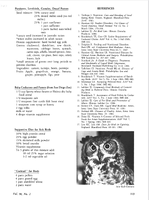How can you get a balanced diet with as little work as possible without feeding pellets?
I mean, in their natural habitat, they don't have bird pellets. They have seeds, nuts, buds, fruits, etc.
If you give them mixed bird seed, nuts, fruits and veggies - is that enough (assuming you also research the specific needs of each specie of bird)?
Any specific vitamins one would recommend that's really good for feather growth and quality?
Awesome thread, and Awesome replies and information!!!
Nutrition, im always reading up on. But then I have to read again as not all stays in my head!
Things I find helpful to keep in mind..
Know your burds weight and track and log weakly..a 3% change in body mass investigate, a 5% change investigate and seek veterinarian care, 5%-10% quickly get to veterinarian. Plus 10% body mass loss asap veterinarian and you are going to have to supplement, support, I use baby burd formula.
Sub adults are still going to bulk up as they reach maturity, so keep that in mind. Species specific. I know for my weaned green checks there was 10-14 gram gain change to adult 2 plus year age. For my weaned quakers there was an increase of 10-25 grams change till 2 years , both of these species seemed to stabilize at 2 years.
You will also pick up hormonal weight gain this way, females are going to increase slightly in breeding season this is normal . Researching breeders also found this to be true in what they see and expect. A big jump and you know they are carrying eggs. Sometimes a slight environmental intervention at this time and you may get lucky and they will re absorb eggs and not go into production. Like moving cage, re arrange, light cycle change, reducing fatty foods , temporarily stopping offering any warm foods.
I only had experience with one male , and his weight increased slightly during each spring breeding season as well. I wasn't able to find information on male hormonal weight change..
What you offer isn't always what's consumed.
Majority of parrots evolved in biological rich environments , with a lot of Nutrition options. Food is readily available, or some species move to follow seasonal availability.
Parrots have a relatively simple quick moving digestive system. You've noticed all the poops

Evolution because of readily available abundance..and as a flighted prey species. They can't be gut loaded down and still fly off quickly..
Parrots didn't evolve to carry a lot of fat stores. Yes some species in captivity can get chubby, Amazon, budgies, cockatiels come to mind..But most Parrots species didn't evolve to carry subcutaneous fat stores or large fat stores. Not needed as stable temperatures environment (most) and because of food availability. This is also why they can get in trouble quickly they live a thin metabolic line, high metabolism, high body temperature, quick moving digestion, little place to store fat.
Caloric need isn't static. A 5 degree drop in temperatures ( American so im talking Fahrenheit, yep sucks at metric) increases Calories need. Xtra stress, activity. Molt is a big one! I've read several studies , eye opener on what's going on in their bodies at this time!! Plasma volume increases even doubling, internal organs are temporarily changed either shrinking liver or increase liver size, immune system changes and more. Molt can increase calories needed by 25% to even 3x the base normal! Usually more protein is also needed at molt. A scruffy look during molt isn't normal. As a community wouldn't shouldn't accept this and validate it. You can make diet changes and you will see a difference. Except for our flock members dealing with chronic health issues, like heart, liver, kidney, advanced age...because molt is so hard on them you might still see some scruffiness .
All of that is important information to keep in mind when thinking about Parrot nutrition.
You might research elclctus parrot diets , as many owners go all fresh. But eckkies are a little unique with slower digestive systems. Maybe evevolved with less abundance. Ok not getting off track on them. But it's a good start point..they still have to include some fats and carbs.
And look into balanced chop recipes. I read a good article from Pamela Clark. Many others out there.
Good old vitamin D, not a lot of diet options to get outside of pellets. So natural unfiltered sunlight exposure. No idea how much is needed ? Daily/weekly/ monthly i don't know. I try and have mine spend time outside safely when I can..
My feeding is something I'm always thinking about and evolving. Currently I'm heavy on the fresh stuff, with seeds and pellets as well.

 But if I had a good eater I would probably do a wide range of veggies, grains, some nuts, a bit of fruit, a bit of egg, and do a Vitamin D3/Calcium supplement.
But if I had a good eater I would probably do a wide range of veggies, grains, some nuts, a bit of fruit, a bit of egg, and do a Vitamin D3/Calcium supplement. 





